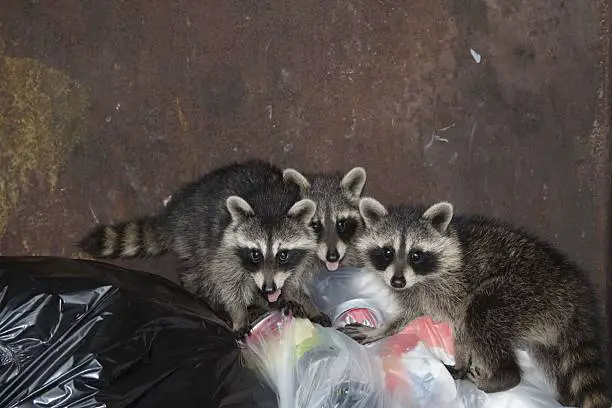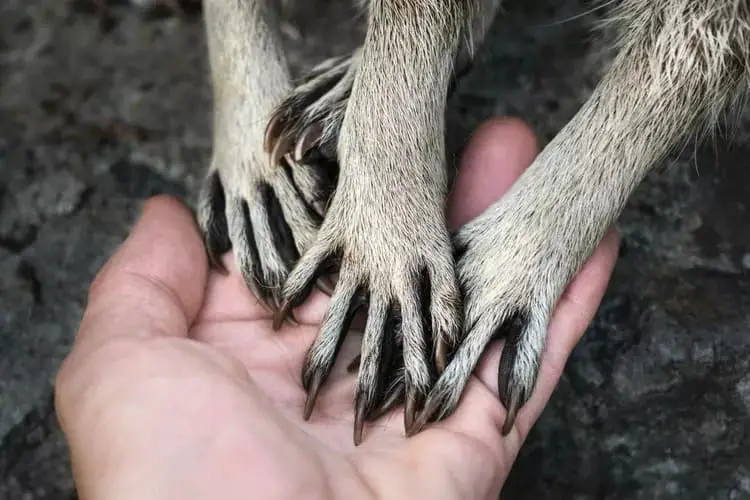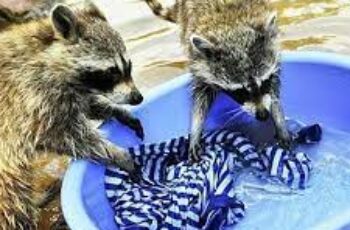Raccoons are interesting animals. If you look at them and their character from every aspect, you will be surprised. Raccoons are lazy animals in terms of food and habitat. They do choose their meal themselves; whatever comes their way is their favorite dish. In terms of habitat, they also live where they find it warm, safe, and close to a food source. In contrast, they are intelligent animals and possess good memories; accidentally, if you punish your raccoon, it will remember it and seek revenge from you. It is absolutely enjoyable to read about raccoons. This article will help you learn five interesting facts about raccoons: Read on to find out Five interesting facts about raccoons
Raccoons are picked up as pets in some parts of the world. Though they carry a wide range of diseases, people love to have raccoons as their pets due to their attractive and charming facial masks. In addition, raccoons are the sort of animals that adapt to urban areas and live with humans. The bad things are that most raccoons are extremely cruel against your property. If they break into your territory, they likely damage your house and even your garden.
Five interesting facts about raccoons
It is advised by many animals’ experts to stay away from raccoons and try not to interact with them, for many significant reasons. First, transferring parasites and other dangerous illnesses to humans and other animals, such as feline distemper, canine distemper, and rabies. Second, they are hurtful at some particular times. Like when, being pregnant, a mother raccoon holds an aggressive behavior toward whoever approaches it. Also, most folks have no idea when and how they become hazardous and would attack. Learn the Five interesting facts about raccoons to handle a raccoon better the next time you meet one.
1.Raccoons are opportunistic eaters
Unlike other mammals, raccoons have a wide range of foodstuffs. They are similar to humans and eat a variety of sustenances like meat, vegetables, and insects. Raccoons are not picky and do not spend much time choosing what to eat; basically, they do not have a favorite dish. Whatever is available would be their favorite food in wild or urban areas. Wild Raccoons ingest fresh vegetation, fruits, insects, larvae, small mammals, amphibians, fish, shellfish, bird eggs, and nestlings in jungles, which are completely different from residential meals.

On the other hand, raccoons invade trash cans, gardens, bird feeders, and unattended pet food in cities. It proves that raccoons are omnivores. What is more, some classes of foods like chocolate, caffeine, grapes, raisins, onions, garlic, chives, avocado, nuts, seeds, and alcohol are not convenient for them. After consuming such diets, raccoons confront some terrible outcomes and even death. In this case, though raccoons are attracted by such foods, they need to skip them.
2.Raccoons have a lot of babies
Raccoons are the sort of animals that give birth to more than one child annually. They usually get pregnant once a year, and a mother raccoon gives birth to 1–6 baby kits. Raccoons will find a safe place for their babies to be safe from predators. They make their habitat to protect their baby kits and keep them in dens and hollow trees. This is why they want to make sure their children are immune and isolated. Raccoons in urban areas try to find spots the same as wild to protect their newborns; they choose porches, sheds, chimneys, and attics. A place that is secure and away from human eyes and access. More importantly, you should not think of moving or even approaching new baby raccoons and their mothers without professional help. Mother raccoons become tremendously aggressive and hurtful towards whoever tryies to move towards their babies.
- Related: How to help an injured raccoon?
3.Raccoons carry diseases and parasites
Similar to other mammals such as dogs, cats, and even humans, raccoons exhibit symptoms whose type, range, and severity depend on the type of infection. Moreover, raccoons are famous for carrying some sort of hazardous and deadly infection. The most common types are rabies, feline distemper, canine distemper, and rabies. All the infections mentioned are deadly and transferable to humans and animals. To know if a raccoon is infected by one of them, you have to look for some specific signs. Signs including staggering, moving in a circle, or perhaps not moving. These are the signs of a rabies-infected raccoon.

Another possible sign is when a raccoon has Vomiting, diarrhea, labored breathing, coughing, and a high fever are the evident signs of canine distemper. Following this, depression, loss of appetite, foamy vomiting, and bloody diarrhea disclose the feline distemper disease. To conclude, illnesses that infect raccoons are absolutely perilous and transitive. They can cause severe health issues and even result in death.
4. Raccoons are intelligent animals
Raccoons are so adaptive and can live in the wild and in residential areas. They have the ability to be pets and live with humans. It reveals that the raccoon is quite intelligent. Some researchers even contend that they are just as good at discriminating as domestic cats, if not more so. In a 2017 study, eight captive raccoons’ capacity for causal cognition was evaluated by academics and published in the journal Animal Cognition. A water-filled cylinder with a marshmallow inside that was too low for the raccoons to reach was displayed to them. The researchers next showed that the water level would rise in the cylinder so that the raccoons could reach the treat if they dropped pebbles into it.
- Related: Do raccoons eat ice cream?
To get the treat, two raccoons figured out how to drop stones. A third discovered a method that was even simpler: she rapidly accessed the marshmallow by toppling the tube. According to the researchers’ findings, the raccoons demonstrated “innovativeness in many aspects of this task.” If you choose a raccoon as a companion, you’ll enjoy its company.
5.Raccoons love the city
Humans come to cities from rural areas to have a better life and access to a broader range of opportunities; perhaps this is true for raccoons. Raccoons flourish in metropolitan environments and enjoy dwelling there. Given that they are sentient creatures with excellent environmental adaptation skills, it makes perfect sense. In general, raccoons in cities seem to be smarter than those in rural areas. Whereas, according to ecologist Sam Zeveloff, raccoon populations in urban and suburban regions have increased in an “astonishing” way during the past 80 years.

Owing to their high level of intelligence, those who live in cities are learning abilities that their rural counterparts lack, such as overcoming man-made barriers. They can fit into a wide variety of sleeping positions, climb fire escapes, and use their dexterous fingers to open garbage cans, enter garages, and enter adjacent buildings. The unpleasant moniker “raccoon capital of the world” has been bestowed on Toronto due to the overpopulation of raccoons; the mayor of the city has even proclaimed a war on raccoons in which “defeat is not an option.”
- What does a raccoon’s stool look like?(+Pictures)
- What can raccoons eat? what to do if a raccoon ingests something dangerous?
- Why are raccoons so destructive? Keep Raccoons Away?
More Raccoon Facts:
Beside the Five interesting facts about raccoons, raccoons have so many more facts which you can have a look at in the below list.
Most raccoons Wash their food Before Eating:
- Racccons are ominverous eaters and sometime might dig into bins and trash cans too. But most wild raccoons love to wash their food before eating.
Raccoons Have Human Hands:
- Raccoons have five toes on their front and back paws. They make use of their hands just like humans and do a range of objects, including latches, lids, jars, boxes, and doorknobs
-
Most raccoons can live an average of 5 years in wild
-
They are very agile climbers.
-
They are preyed on by coyotes, wolves, hawks, and owls.
-
Raccoons are nocturnal animals. Raccoons hardly go out during daylight
-
Raccoons have excellent night vision.

Raccoons Hands
FAQ
1. What is special about racoons?
Raccoons are renowned for their intelligence, strong memory, and puzzle-solving skills. Despite lacking opposable thumbs, they manage to pry objects open with their strong paws and claws, which accounts for their cunning reputation.
2. How smart are raccoons?
Unexpectedly, raccoons have a high level of intellect. According to recent cognitive testing, urban raccoons rank just below monkeys in IQ, making them noticeably smarter than your cat or dog. They are highly creative and adaptable since they are incredibly inquisitive and persistent beings.
3. Are raccoons color blind?
Raccoons are believed to be colorblind, or at least to have poor color vision. They are having eyes that are ideally suited to detect green light.
4. Where do raccoons build their nests?
Raccoons create their den to near food, water and a place they can create a latrine. Home of this wild animals are called dens. Raccoons often create nests in tree hollows, burrows, or even attics.
5. Do male raccoons play a role in parenting?
Female raccoon or mother raccoon has the most important part in rasing a baby raccoon. Whereas, Male raccoons are not directly involved in raising the young.
- Related: What to do if a raccoons bite you?
Conclusion
To sum up, raccoons are special mammals that possess complicated personalities, which separates them from other animals. Most raccoons have interesting lifestyle and interesting facts about raccoons; for instance, they usually have a distinct diet routine compared to other wild animals and ingest a variety of foods. As well, raccoons reproduce several babies over a year and are highly protective about them, which results in an excessive number in their colony. Related to this, raccoons find urban locations charming to give birth to due to safety and warmth. Also, raccoons are extremely smart and adaptive in remembering and settling in the community where other living beings live. Finally, raccoons can be dangerous as well because of their sensitiveness to pathogens that infect them.
They carry them and possibly transmit them to humans and animals in contact with them or close to their dens or habitat. Last but not least, according to the majority of animals’ experts, raccoons can be risky for humans and pets. So, it is fruitful to avoid picking a raccoon as a pet, patting it, and even when it is sick, do not touch it because of their infectiousness.


